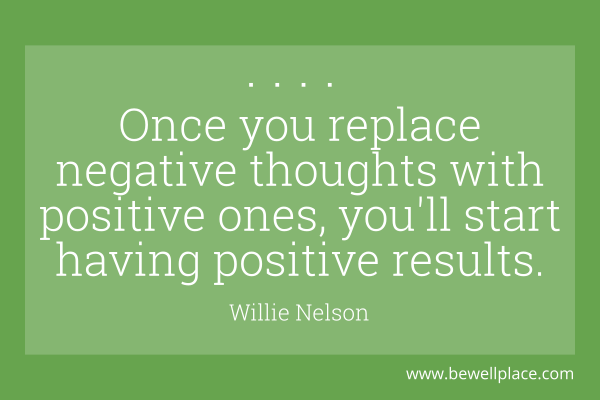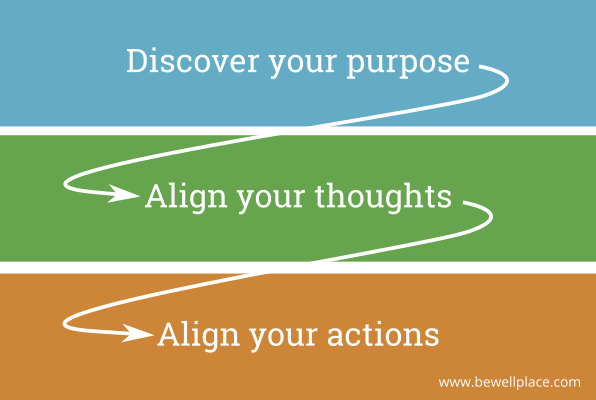To achieve the life of your dreams, you need to align your thoughts with what’s truly important to you. If you have no idea what’s truly important to you, check out: What Is Your Purpose in Life? Do This and Find Out.
Once you get a decent handle on what you truly value, the next step is to think about what you think about.
Your thoughts are critical to your life. What you think about all day long inevitably manifests. It’s just like René Descartes, the smarty pants from France, said: “I think, therefore I am.” And what Buddha preached: “With our thoughts, we make the world.”
How is this so?
Well, it helps to first ask the question: What is a thought?
As an engineer from MIT explains, thoughts are electron signals that spread like wildfire throughout the brain. For example, as you read these words, individual electrical signals are sent to your brain, and “within a few hundred milliseconds, [each] signal has spread to billions of neurons in several dozen interconnected areas of your brain.”
Pretty cool. But what the heck does it mean? Here’s a short video from New Scientist that might help:
As New Scientist explains, we don’t know a whole a lot about thoughts. And so far, all we can measure and assess are the physiological aspects of the brain. Though New Scientist flirts with the idea that thoughts are part of a “cosmic consciousness that spans the universe but is completely undetectable by science,” it’s just easier to study electrical signals and neurological activity. And New Scientist isn’t wrong for focusing on what we know here on Earth over an otherworldly explanation.
Eckhart Tolle reminds us that we probably shouldn’t be hunting around for the source of our thoughts – it isn’t practical nor does it help us remove suffering from our daily lives. He goes into concepts such as energy, resonance and the collective mind to explain how thoughts arise in our individual minds and how our thoughts affect the world. Here’s a good video to watch (you can stop at 4:11 – we’ll pick up the rest in a different article):
(Isn’t he so stinkin’ cute? I just want to pinch his little cheeks! Sorry…inappropriate…)
The point is: Thoughts happen, and they affect what we do and how we perceive the world.
So, in order to align our lives with what’s truly important to us, we need to take pause and assess what we’re thinking about all day long.
Assess Your Thoughts
Let’s do a mental exercise called, Think About Your Thoughts. You don’t need to find a quiet place and light candles or anything. Just take a breath and resolve to be open and honest with yourself. Here we go:
Think about Your Thoughts
Consider your true purpose or your five most important things list. Notice the following:
- When you think about what you truly value, what are your initial thoughts and feelings? Do you feel nervous, excited or sad? Are your thoughts positive or negative?
- When you picture yourself pursuing your purpose or important things, are you happy or struggling? Are you alone or among supporters? Do you succeed or fail?
- What tangential thoughts come to mind? Do you think about money, other people’s opinions or consequences?
- Are your thoughts drifting? If so, to where?
Notice common themes in your thinking. They may not necessarily be positive or negative, but start to observe your personal patterns and thinking habits such as:
- Your initial, reactionary thoughts
- Your thoughts about the past, present and future
- Feelings that result from your thoughts
- Where your thoughts drift
When you pay attention to your thoughts, you learn a lot about how your brain works. And the more you understand your brain, the more you can adjust your thoughts so that they align with what’s truly important to you.
Align Your Thoughts With Your Purpose
Assessing your thoughts isn’t complicated, but it does take practice and patience. Once you get a knack for identifying your thoughts and feelings, you’re ready for the next step: alignment.

Chances are that most of the thoughts running through your brain aren’t helpful and aren’t aligned with what’s important to you. You probably think about all sorts of unrelated things that have nothing to do with your life goals. Random, unrelated thoughts are totally fine, but you need to learn how to manage your mind and focus your thoughts so that you actually achieve your goals. Consider this method:
Align Your Thoughts
First, identify the thoughts you need to think and the thoughts that get in the way. Ask yourself these questions:
- What thoughts do I need to achieve my goals?
- Do I currently think these thoughts?
- Which of my thoughts are counterproductive to my true purpose?
Once you know which thoughts to keep and which to discard, the next step is to practice intercepting counterproductive thoughts and replacing them with productive thoughts. This is definitely the hardest part. Here is a simple method that takes a lot of practice and patience:
- Identify the thought.
- Determine if the thought is productive or counterproductive.
- If productive, keep thinking that thought.
- If counterproductive, go to the next step.
- Resist the urge to:
- Scold yourself for thinking the counterproductive thought. Self-scolding is counterproductive itself. Instead, simply observe the thought from a neutral state.
- Determine the source of the counterproductive thought. It arose. Whoopty do. Your job is not to explore the origin of your thought. (Refer to Eckhart Tolle’s video above.)
- Determine why the thought is counterproductive. Most likely, the thought is negative, self-deprecating or rooted in anger, jealousy or other forms of hate.
- Decide that it’s silly to think such counterproductive thoughts and that you have the ability to change how you think.
- Think of a replacement thought, a better thought, one that aligns with what’s truly important to you.
- Determine why the replacement thought is productive.
- Keep thinking the productive thought.
Now, here’s the thing:
If you find that your thoughts center around a common theme that has nothing to do with what you claim to be important to you, you might need to reassess what’s truly important to you. Your thoughts give you clues as to what you value. There’s no sense in forcing yourself to value something if your internal workings are pulling you in another direction.
Now What?
Holy moly. We’re definitely in headache territory now.
Don’t worry, it gets easier the more you practice. Intercepting thoughts and replacing them with new ones is a skill that you develop over time. So, just keep at it, especially when it gets frustrating.
The good news is you don’t have to wait until you’re a master thinker to take the next step. Once you start to get the hang of it, you can move onto aligning your actions with your thoughts.

Although our thoughts create our reality, our actions ultimately determine where we end up in life. In the next article, we’ll discuss the third component that launches us on our path.
Sources:
MIT Ask an Engineer: What Are Thoughts Made Of?
Explanimator: What Is a Thought Made Of?
Eckhard Tolle: Where Do Our Thoughts Come From?
Subscribe!
Enter your email address and receive inspiration right to your inbox.
Please check your email and click on the confirmation link to complete your subscription.

